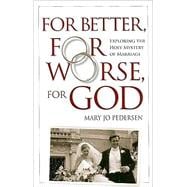
| Acknowledgments | p. vii |
| The Meaning of Marriage: How Can Christian Faith Make a Difference? | p. 1 |
| The Promise: What Did You Say on Your Wedding Day? | p. 11 |
| Marriage as Vocation: The Call to Partnered Holiness | p. 23 |
| Marriage as Sacrament: Human Love as a Sign | p. 53 |
| Marriage as Covenant: For Better, for Worse, with God | p. 65 |
| Couple Spirituality: The Mystery in the Mundane | p. 85 |
| How Married Love Grows: Seasons of Dying, Waiting, and Finding New Life | p. 99 |
| How Married Love Gives Life: A Spirituality of Nurture | p. 111 |
| Sex and Spirituality: How Marriage Brings the Two Together | p. 125 |
| Forgiveness and Reconciliation: What Makes Covenant Love Possible | p. 143 |
| How to Deepen the Spiritual Connection: Nine Practices for Life Together | p. 161 |
| Epilogue: It's Up to You | p. 189 |
| Homemade Holiness for Married Couples | p. 191 |
| Practical Considerations for Couple Prayer | p. 193 |
| Recreation Inventory | p. 197 |
| Selected Bibliography | p. 199 |
| Table of Contents provided by Ingram. All Rights Reserved. |
The New copy of this book will include any supplemental materials advertised. Please check the title of the book to determine if it should include any access cards, study guides, lab manuals, CDs, etc.
The Used, Rental and eBook copies of this book are not guaranteed to include any supplemental materials. Typically, only the book itself is included. This is true even if the title states it includes any access cards, study guides, lab manuals, CDs, etc.